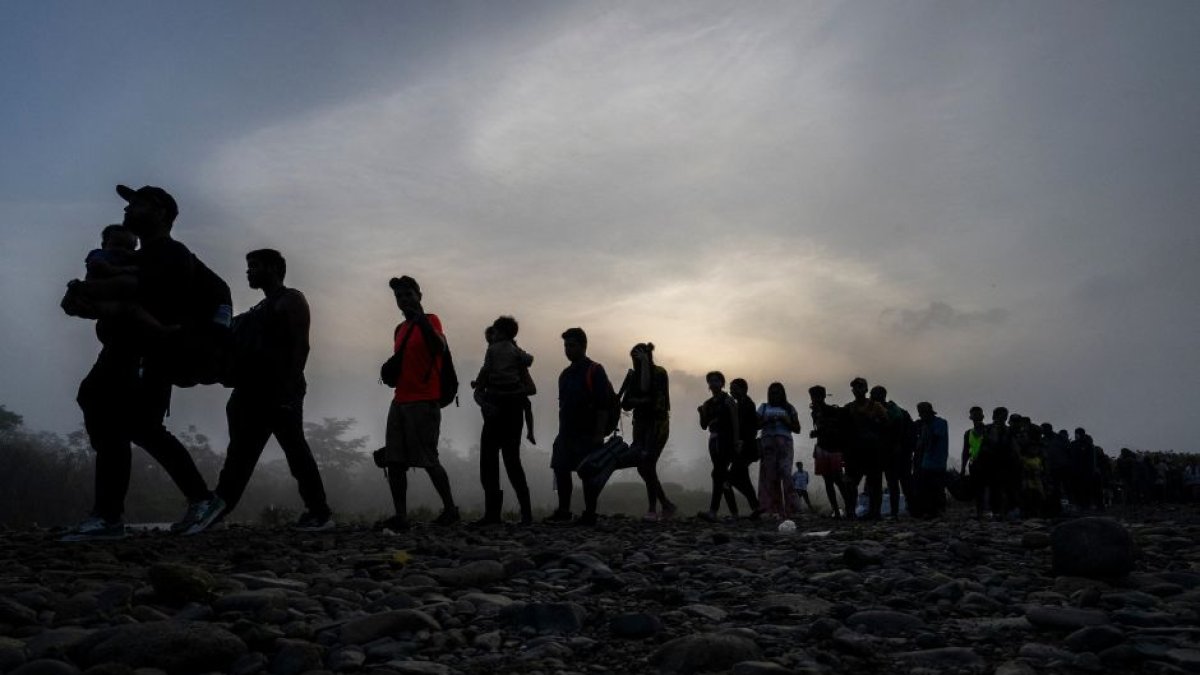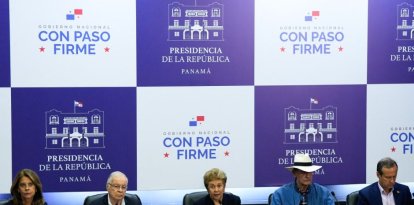Human Rights Watch condemns Colombia and Panama's failure to protect migrants in Darién Gap
The organization explained that those who cross the dangerous jungle suffer abuse, including sexual violence, by criminal groups. Many cases are not investigated by authorities.

(AFP)
A Human Rights Watch (HRW) report explained that Colombia and Panama are failing to effectively protect and assist the hundreds of thousands of migrants and asylum seekers traveling through the Darién Gap. In this regard, the organization identified shortcomings in the efforts of these Latin American countries to protect and assist people, including those most at risk, such as unaccompanied children, as well as to investigate abuses against them.
It is a 110-page report titled “Neglected in the Jungle: Inadequate Protection and Assistance for Migrants and Asylum Seekers Crossing the Darién Gap.” The report records four visits the organization made to the jungle between April 2022 and June 2023. HRW interviewed nearly 300 people, including migrants and asylum seekers, victims of serious abuses, humanitarian workers, and Colombian and Panamanian authorities.
"Human Rights Watch found that on both sides of the border, the authorities are failing to effectively protect the right to life and physical integrity of transiting migrants and asylum seekers, and to investigate violations effectively, promptly, and thoroughly. Efforts to guarantee access to food, water, and essential healthcare services have proven inadequate, affecting the basic rights of both migrants and local communities that have experienced longstanding marginalization, high poverty rates, and a lack of opportunities," explained the organization in the summary of the report.
Similarly, Human Rights Watch indicated that "crimes against migrants and asylum seekers in the Darién Gap, including pervasive cases of sexual violence, go largely uninvestigated and unpunished on both sides of the border. Accountability for these abuses is rare due to a combination of limited resources and personnel, a lack of a criminal investigation strategy for these cases, and poor coordination between Colombian and Panamanian authorities."
'Efforts to investigate crimes and dismantle the Gulf Clan in the region have yielded minimal results'
Human Rights Watch said that one of the main reasons why migrants are not being protected is because Panama and Colombia do not have a proper strategy to deal with the migration crisis in the region. It argued that the scarce government presence in the region leaves migrants in the hands of the Gulf Clan, an armed group involved in drug trafficking that controls the transit of migrants and asylum seekers and profits from their desperation and vulnerability.
"Colombian authorities’ efforts to investigate crimes and dismantle the Gulf Clan in the region have yielded minimal results. The government lacks reliable information on the number of migrants crossing and their humanitarian needs, impacting authorities’ ability to effectively ensure the rights to access food, water and sanitation. Mayor’s offices from departing municipalities lack sufficient expertise, personnel, and resources to respond to the increased influx of migrants and asylum seekers," HRW said.
In the case of Panama, the report specified that "Panamanian authorities enforce what they call a 'humanitarian flow' (earlier labeled simply 'controlled flow') of migrants and asylum seekers through the country ... The policy appears focused on restricting the free movement of migrants and asylum seekers within Panama and seeking their swift exit to Costa Rica, rather than on addressing their needs."
It also questioned several government decisions. For example, on March 4, the Panamanian government suspended the work of Médecins Sans Frontières (MSF or Doctors Without Borders) in the country. Panama argued that its agreement with the humanitarian organization had expired in December. " MSF, which played a leading role in assisting migrants and asylum seekers, including hundreds of victims of sexual violence, said it has repeatedly sought to renew the agreement," HRW said.
"Restricting MSF's work is the exact opposite of what is needed to address the situation in the Darien Gap. Panamanian authorities must urgently reconsider this decision to guarantee the rights of migrants and asylum seekers, including victims of sexual violence," said Juanita Goebertus.
HRW also called for coordination among countries in the region to address the migration crisis. The organization stated that "will require broader efforts from across the region. As Human Rights Watch has recommended in the first report in this series, Latin American governments and the United States should reverse measures that are preventing access to asylum and forcing people into dangerous crossings like the Darién Gap."
A large increase in the number of people crossing the Darién Gap
The Human Rights Watch report was published the same week that Panama's Public Security Ministry reported that a total of 109,069 immigrants seeking to reach the United States irregularly crossed the Darién Gap in the first quarter of 2024. This is a large increase compared to the 87,390 who did so in the same period in 2023.
The region is experiencing a worsening migration crisis mainly due to political and social instability in countries such as Venezuela. The Interagency Coordination Platform for Refugees and Migrants from Venezuela (R4V) published a report in which it explained that the year 2023 ended with at least 7.7 million people who decided to emigrate from Venezuela.
Crime, the humanitarian crisis and the dictatorship are the reasons why Venezuelans are increasingly emigrating from their country. A report by HumVenezuela that was shared by Human Rights Watch, noted in March that "most Venezuelans face difficulties in accessing food, with 10.9 million undernourished or chronically hungry. Some 4.3 million are deprived of food, sometimes going days without eating."

























